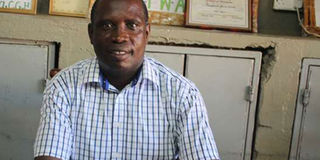Happening Now: Labour Day celebrations 2025
Celebrating the heroes: A teacher’s crusade for disabled children

Patrick Muzungu. The head teacher of Sahajanand Special School in Mtwapa completed his “O” Levels in 1984, at Ganze Secondary School. FILE PHOTO
What you need to know:
- In 1985 he began teaching as an untrained teacher at Milore Primary School in Ganze Sub County and sat his “A” Level examination in 1989, as a private candidate.
- Mr Muzungu, who now holds a Bachelor of Education degree (religious studies and the Kenya sign language), has been at the helm of Sahajanand since 2007.
While growing up in Ganze Sub- County of Kilifi County, Patrick Muzungu, would sympathise with his deaf aunt, who was in an abusive marriage.
Her deafness made it hard for her to share her plight with anybody.
But young Muzungu would see the pain in her eyes.
When he earned his first salary as an untrained teacher in 1985, he refunded his aunt’s bride price and took her back to her family to ease her suffering.
It is this empathy that would make Mr Muzungu opt for a diploma in special education, majoring in hearing difficulties, when he got a chance to further his education.
The head teacher of Sahajanand Special School in Mtwapa completed his “O” Levels in 1984, at Ganze Secondary School.
In 1985 he began teaching as an untrained teacher at Milore Primary School in Ganze Sub County and sat his “A” Level examination in 1989, as a private candidate.
In the same year, he began an in-service course at Shanzu Teachers’ Training College, graduating in 1993 as a P1 teacher.
He would teach in several schools before joining Kibarani School for the Deaf in 1997.
While with his training he was now able to handle disabled children, his move to Sahajanand Special School would come unexpectedly.
On August 30, 2006 President Mwai Kibaki went to Mtwapa to open the newly constructed Mtwapa Primary School, fondly called KP (Kanji Patel) Junior.
The directors of Mombasa Cement Company, who are the sponsors, decided to start the special school after a resident brought along 20 children with physical disabilities.
SPECIAL CURRICULUM
And who was better placed to handle these children than Mr Muzungu?
He was transferred from Kibarani School for the Deaf to the newly opened Mtwapa Primary School in 2007 for this job.
As a start, a class was set aside for them.
But over the years the number of pupils with special needs would grow.
Mombasa Cement Company then funded the construction of Sahajanand Special School next to Mtwapa Primary School.
This school registered its second lot of candidates with hearing impairment for the Kenya Certificate of Primary Education this year.
Mr Muzungu, who now holds a Bachelor of Education degree (religious studies and the Kenya sign language), has been at the helm of Sahajanand since 2007.
He has seen the school grow from a single classroom in Mtwapa Primary School, to its current population of 800 pupils, 37 teachers and a work force of 200.
Sahajanand Special School is part of the Sahajanand Centre of Excellence.
This centre incorporates the special school, a vocational training wing and an integrated technical secondary school which starts next year.
All these special units and Mtwapa Primary and Mtwapa Secondary School are sponsored by Mombasa Cement Company. They comprise the Mtwapa education complex.
Mr Muzungu, who is currently pursuing a master’s degree in business administration, says that he deals with some pupils with cerebral palsy and autism (hyperactivity).
There are also blind and deaf children. Sahajanand is also home to children rescued from difficult circumstances in the streets and abusive homes.
“At Sahajanand we follow special curricula for the deaf, blind and those with learning difficulties,” says Mr Muzungu.
GOOD JOB
But the physically handicapped children and those rescued from difficult circumstances follow an integrated curriculum and are incorporated into the regular Mtwapa Primary School at some point.
“They also go on to join the Mtwapa Day Secondary School alongside normal pupils.”
Plans have been finalised to start an inclusive technical secondary school next year so that children with physical disabilities can develop their skills alongside normal pupils.
“A vocational training wing for the physically and mentally challenged children offers courses in shoe making, weaving and beading and papier mache.”
Mr Mohammed Rafiq, the representative of the sponsors on the school’s Board of Management as well as chairman Ibrahim Khamis Athman Mutwafy commend Mr Muzungu for his sacrifice.
Teachers Service Commission chief executive Nancy Njeri Macharia, who visited the school in June, described Mr Muzungu as a hero and an inspiration to many on how to care for disadvantaged children.
She urged people to visit schools with special needs children.
The TSC has posted a deputy headteacher to take charge of the integrated technical secondary school.
“We shall post enough teachers to Sahajanand and other special schools to give such children a chance to learn.”

